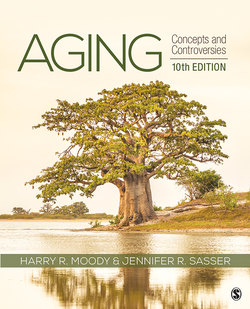Читать книгу Aging - Harry R. Moody - Страница 82
На сайте Литреса книга снята с продажи.
Urban Legends of Aging
Оглавление“Aging is not a disease.”
Most gerontologists agree that aging is not a disease. Yet a growing number of biologists reject this proposition, and serious work on slowing the process of aging is now under way in the laboratory. In other words, they treat aging as if it’s a curable pathological condition. Of course, no one has ever defined exactly what a “disease” is, so it’s hard to prove the point one way or another (Moody & Hayflick, 2003).
Caloric restriction in mice has similar effects even when it is begun in midlife. Rodents live longer if they eat a diet with 40% fewer calories than normal, as long as their diet remains otherwise nutritionally sound. When caloric intake is restricted, age-related deterioration slows down, and age-related diseases, such as kidney problems and autoimmune syndromes, are diminished (Bronson & Lipman, 1991). The rats’ condition does not deteriorate until late in a long life. Under such a diet, both average life expectancy and maximum life span increase by 30%. Apparently, the rate of acceleration of aging has been reduced.
What accounts for this dramatic, well-established impact of dietary restriction in enhancing longevity? The longevity gain is achieved not through reduction in any specific component of the diet, but simply because of fewer total calories consumed. One possible explanation is that caloric reduction slows metabolism, or the rate at which food is transformed into energy (Demetrius, 2004). With caloric reduction, the basic biological clock slows down. But we cannot be sure of this explanation because caloric restriction is consistent with many different mechanisms of biological aging, including DNA, free radicals, and a stronger immune system. The results are clear enough for rodents, and experiments with primates have begun to confirm that caloric restriction is effective there as well (Couzin, 1998). However, more recent research has found just the opposite: Caloric restriction with rhesus monkeys did not contribute to “improved survival” (Mattison et al., 2012).
In human terms, caloric reduction would mean surviving on a diet of 1,400 calories a day, but, in return, it would mean, in theory, gaining 30 extra years of life. To achieve this goal, Roy Walford (1986), one of the premier investigators of the biology of aging, has proposed a so-called high-low diet that incorporates high nutritional value with low calories.
A similar approach is suggested by cryobiology, or the study of organisms at low temperatures. Lowering internal body temperature can increase life span in fruit flies as well as vertebrates, such as the fence lizard, an animal that lives twice as long in New England as its cousins do in sunny, warm Florida. Experiments with fish demonstrate that with lower temperature, life span is prolonged in the second half of life. Lower temperature can significantly reduce DNA damage. We don’t yet know whether cryobiological processes apply to warm-blooded animals like humans. However, calorie restriction also seems to lower body temperature a small amount. Calorie-restricted mice have a lower average body temperature, and the temperature changes according to biorhythm.
Caloric restriction somehow protects genes from damage by the environment and perhaps strengthens the immune system. Caloric restriction also reduces the incidence of cancer. The experimental findings on caloric reduction converge with what is known about indirect regulation of genetic expression that controls the aging process.
Some recent evidence in human clinical trials suggests that caloric restriction, without malnutrition, can reduce vulnerability to disease and slow the process of aging in human beings. But the gains here come from dramatically changing a person’s diet. It is reminiscent of the old joke: “Doctor, if I follow your low-calorie diet, will I live longer or will it just seem longer?” Biologists are now looking for the cellular and molecular mechanism by which caloric restriction works, offering the possibility that lifespan extension could be achieved by interventions other than diet (Anderson, Le Couteur, & de Cabo, 2018).
